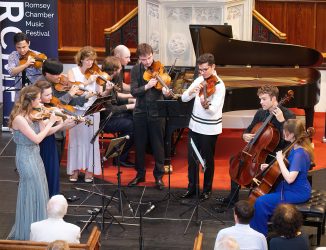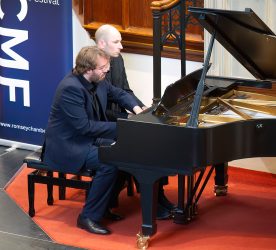Laura Rickard’s imaginatively devised voyage of chamber music discovery concludes in Romsey – Seen and Heard Worldwide
 United Kingdom Varied – Romsey Chamber Music Pageant 2024 [2]: Sophia Jin (soprano), Thomas Guthrie (baritone), Imogen Whitehead (trumpet), Laura Rickard, Emma Roijackers, Luke Hsu (violin), José Nunes, Joseph Griffin, Coby Mendez (viola), Rainer Crosett, Lydia Hillerudh (cello), James Trowbridge (double bass), Johan Löfving (guitar), Jennifer Walsh, Michael Cohen-Weissert, Caspar Vos (piano). Houghton Lodge Gardens, Romsey Abbey, St. Mark’s Church, Ampfield, United Reformed Church, Romsey, 24-30.6.2024. (CK)
United Kingdom Varied – Romsey Chamber Music Pageant 2024 [2]: Sophia Jin (soprano), Thomas Guthrie (baritone), Imogen Whitehead (trumpet), Laura Rickard, Emma Roijackers, Luke Hsu (violin), José Nunes, Joseph Griffin, Coby Mendez (viola), Rainer Crosett, Lydia Hillerudh (cello), James Trowbridge (double bass), Johan Löfving (guitar), Jennifer Walsh, Michael Cohen-Weissert, Caspar Vos (piano). Houghton Lodge Gardens, Romsey Abbey, St. Mark’s Church, Ampfield, United Reformed Church, Romsey, 24-30.6.2024. (CK)

Studying their biographies within the wonderful programme guide makes one realise how versatile these younger skilled musicians should be, and the way passionately dedicated they’re, not least to taking music past the parameters of the established concert-going public; an important ingredient of the Pageant is their classes in colleges, inspiring and enabling younger gamers and creating new audiences. Earlier than Saturday’s Household Live performance I watched Mexican multi-instrumentalist Coby Mendez working with a big group of kids, instructing them a bull-trainer’s dance and a few fascinating issues about Mexico alongside the way in which – stimulating their curiosity whereas encouraging them in communal exercise. Within the Household Live performance itself, Lydia Hillerudh’s storytelling (from Margery Williams’s The Velveteen Rabbit) alternated with skilfully chosen musical extracts to create a beguiling journey for younger and previous.
The primary half of Saturday night’s live performance consisted solely of songs. Emma Roijackers and Michael Cohen-Weissert performed a transcription for violin and piano of the Chant de Roxane from Szymanowski’s somewhat great opera King Roger (I effectively bear in mind an English Nationwide Opera efficiency beneath Mackerras in 1976, and Rattle’s BBC Proms efficiency in 1998). It’s a extremely atmospheric piece; the track itself is launched low on the G string, reappearing later in ghostly harmonics. Maybe Laura would possibly contemplate programming Szymanowski’s Mythes for violin and piano at a future Pageant. Lydia then joined Michael in transcriptions for cello and piano of 5 of Alma Mahler’s songs – written across the time of her affair with Zemlinsky, her piano instructor, however not revealed till a lot later (as Laura trenchantly put it in her programme notice, Mahler made it clear that there was solely room for one composer within the household, and it wasn’t her). Lydia and Michael gave the music’s post-Wagnerian lushness full worth.
Lastly, in Jennifer Higdon’s song-cycle Love Candy (Suite?) we had a singer: and what a singer! The 5 chosen Amy Lowell poems chart the trajectory of a relationship (somewhat like Lucinda Williams’s Automotive Wheels on a Gravel Street): Sophia Jin’s ethereal, lovely soprano flew via the entire cycle, like a chicken – ecstatic, lyrical, free within the opening track, trapped contained in the closed sonnet type within the final. It was gorgeous. So too was the instrumental accompaniment (Luke Hsu, violin; Lydia Hillerudh, cello; Caspar Vos, piano): gentle and joyful within the first track, violin and cello curling gently over starlit piano chords within the second, turning sinister within the later ones (Caspar ‘stopping’ the notes of the piano with a finger on the strings), fading lastly like a dying heartbeat. An impressive efficiency of a stand-out piece.
As Laura stated in her introduction, it was a pity that Romsey common Ziteng Fan was prevented by sickness from coming this yr – Robert Schumann’s Piano Quartet, Op.47 is outwardly her favorite piece to play. Michael Cohen-Weissert took her place, joined by Laura (violin), José Nunes (viola) and Rainer Crosett (cello). It was a beautiful efficiency, worthy of Laura’s description as ‘a love-song to Clara’. A solemn introduction, after which off we went, in enjoying of such vitality and pleasure! After the quicksilver Scherzo, a glowing introduction of the Andante cantabile theme on Rainer’s cello; great, easeful music-making from all 4 gamers. The dashing figures that open the finale led to a different nice surge of pleasure: they appeared to relish enjoying this music much more than we loved listening to it. Bravo!
The Pageant’s closing afternoon introduced a stunning recital on trumpet and flugelhorn by Imogen Whitehead, accompanied on the piano by Jennifer Walsh. Imogen had chosen items – almost all of them latest or up to date – with which she has a private connection: both commissioned for her and Jennifer, written particularly for her, or organized for her; one was a world premiere. At least three of the featured composers have been current (together with Imogen’s father, liable for the stunning association of O Waly Waly performed by Imogen as her encore). I discovered myself wishing for the umpteenth time that I might bottle in phrases the zing, the zest of this live performance: however you needed to be there.
After Sally Beamish’s quirkily sensible Trinculo (one in all a set of musical portraits of characters from The Tempest) Imogen exchanged her trumpet for a flugelhorn, an instrument she champions. She and Jennifer performed the second motion, entitled I’ll Love my Love, from Barry Mills’s Concerto for Trumpet and Flugelhorn, written particularly for her; this was the primary efficiency of an association he had made for Imogen and Jennifer. It was an attractive therapy of a Cornish people track, launched by a meditative passage for piano, and ended by the piano, its previous couple of notes sustained to make a magical chord.
Barry Mills was within the viewers, as was Charlotte Harding, whose To Keep Open for solo flugelhorn was given its world premiere. Charlotte is a eager sports activities fan, and the title has bodily in addition to psychological resonance: she describes it as ‘a piece primarily based on connection: pores and skin to brass, soundwave to house, head to coronary heart…the notions of ‘being open’ and ‘connection via creation’ are explored and joyfully celebrated.’ Imogen’s long-breathed flugel enjoying conjured up a way of enlargement, of open house (somewhat as Copland’s Fanfare for the Widespread Man does); her upward runs generated a way of rising vitality and pleasure.
After Stephen Dodgson’s ten-minute Trumpet Concerto (his final composition) – with a posh, Stravinsky-like first motion, a unusual second like fragments of fashionable track and a virtuosic finale, light-hearted and insouciant – Imogen took a deserved break whereas Jennifer performed two Canons by Ethel Smyth (‘one in all my favorite composers’): the primary an prolonged Nocturne, the second transient, ruminative, Bach-like; neither of them, in Jennifer’s fluent and poetic enjoying, sounding in any respect like a dry, formal train.
Characteristically, Peter Maxwell Davies’s Sonatina for Solo Trumpet packs three actions into two minutes: spiky, unpredictable, arduous to play – typical PMD. Imogen dispatched it with astonishing dexterity, together with some dazzling flutter-tonguing. If this piece made me smile, the mild Scotch snaps of PMD’s Farewell to Stromness introduced me near tears: I lived in Orkney for eight years, and I’ve usually watched Stromness recede because the ferry passes the cliffs of Hoy and heads out into the Pentland Firth. My brother, who was the GP on Hoy, wrote phrases for the tune, they usually have been sung at his funeral on the island. Listening to it so sensitively performed on Imogen’s flugel and Jennifer’s piano was one thing that I’ll bear in mind.
Imogen and Jennifer ended their recital by diving again into the nineteenth century for Robert Schumann’s Adagio and Allegro, Op.70: Schumann’s music is at all times loveable, and this pair of items have been like a show of the 2 sides of his nature: ‘Eusebius’ (reflective) and ‘Florestan’ (boisterous). Then the encore talked about above, the melody floating at first on smooth waves on the piano, then like working water, then on luminous chords; passing to the piano’s bass register earlier than the flugel ended alone. Imogen’s father blew her a kiss. A particular finish to a particular live performance: it left me hoping that I’ll someday hear Imogen play the offstage posthorn solo in my favorite symphony, Mahler’s Third.
It was an excellent thought of Laura’s to start the Pageant Finale with Scelsi’s Trio IV and Purcell’s Fantasia on One Notice, segueing from the one to the opposite with no break. The Scelsi was performed by Emma Roijackers (violin), Joseph Griffin (viola) and Rainer Crosett (cello). Rainer first demonstrated the strain generated when a notice bends, because it have been, out of true: the Scelsi piece topics the notice C to a gradual improve in tone and stress, ending in a cello plunge to the depths. They have been joined by Laura (violin) and José Nunes (viola) for Purcell: after Scelsi the sounds have been like balm, however with Joseph sustaining the notice C all through it sounded as if Scelsi was nonetheless hovering someplace within the background: actually a consequence of this impressed juxtaposition was that I heard the entire live performance in a barely completely different approach.

Again on acquainted, well-loved floor with Schubert’s Fantasy in F minor for Piano 4-Fingers, performed by Michael Cohen-Weissert and Caspar Vos. Caspar was very humorous about how two beforehand unacquainted pianists measurement one another up and determine who sits the place on the keyboard. They gave it an absorbing efficiency, haunting, highly effective, deft (the airborne Scherzo), magical (its Trio, con delicatezza), spectacular in its complexity and drive (the fugue) earlier than the return of the opening music and the quiet shut. It was enthusiastically acquired – certainly, I questioned for a second if they may swap locations and play the entire piece once more.
Korngold’s String Quintet – what a beautiful climax to a pageant about love and insanity! Korngold at 24 was already on the peak of his powers – he had simply written his extraordinary, hallucinatory opera Die Tote Stadt, and, as Lydia informed us in her sparky introduction, head over heels in love. His no-holds-barred quintet is a marathon for the gamers, exhilarating (and exhausting) for the viewers. Such vitality and keenness! Caspar (piano), Luke and Laura (violin), José (viola) and Lydia (cello) hurled themselves into it: they appeared to have an infinite number of tones at their disposal within the astonishing first motion, hovering ecstasy and romantic craving within the second, a giddily festive brilliance within the finale (fireworks from Luke). It was extraordinary.
Laura deserves recognition for her braveness and enterprise in mounting a Pageant equivalent to this – so imaginatively devised, with unfamiliar and cutting-edge items rubbing shoulders with established classics, offering each a feast and a voyage of discovery for her loyal viewers. Talking after the efficiency, she acknowledged that within the present local weather it’s troublesome to fund creative occasions within the UK: and she or he saluted the adventurousness and dedication of her invited gamers – ‘It’s uncommon to return to a pageant and play this many notes!’ Then all of them put down their bows and performed Leroy Anderson’s Plink, Plank, Plunk! as a closing encore.
I’m already wanting ahead to subsequent yr.
Chris Kettle
For the primary a part of this Romsey roundup click on right here.
